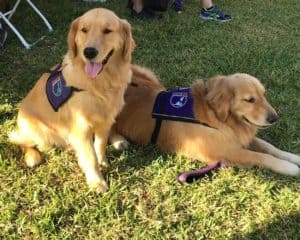Dog Training for Service Dogs Near Me: Choosing the Right Program
Service dogs are invaluable companions for individuals with disabilities, providing both practical assistance and emotional support. If you’re searching for “dog training for service dogs near me,” it’s important to select a program that meets high standards of training and ethics. This guide will help you navigate the process, from understanding what service dog training entails to finding a local program that suits your needs.
 Dog Training for Service Dogs Near Me: What Is It?
Dog Training for Service Dogs Near Me: What Is It?
Service dog training prepares dogs to perform specific tasks that assist individuals with disabilities. These tasks vary based on the handler’s needs but may include:
- Guiding individuals with visual impairments.
- Alerting to sounds for those with hearing disabilities.
- Assisting with mobility and balance.
- Responding to medical emergencies, such as detecting low blood sugar or impending seizures.
- Providing emotional grounding for individuals with PTSD or anxiety disorders.
Service animals, as defined under the Americans with Disabilities Act (ADA), are distinct from therapy and emotional support animals due to their specialized training and the legal protections they receive.
Under the Americans with Disabilities Act (ADA), service dogs are granted public access rights, enabling them to accompany their handlers in most public spaces.
Understanding Service Dogs
Service dogs are highly trained animals that assist individuals with disabilities, providing them with independence, confidence, and companionship. These dogs are individually trained to perform specific tasks that mitigate the effects of their handler’s disability. For instance, a service dog might open doors, pick up dropped items, or provide emotional support during stressful situations. The tasks they perform are tailored to the unique needs of their handler, ensuring they can navigate everyday life with greater ease and security. Under the Americans with Disabilities Act (ADA), service dogs are granted the right to accompany their handlers in all public spaces, including restaurants, stores, and public transportation, ensuring they can support their handlers wherever they go.
The Process of Training a Service Dog
Extensive training a service dog is a rigorous and comprehensive process that typically involves several stages:
1. Basic Obedience and Socialization
Future service dogs begin with obedience training, mastering foundational commands like sit, stay, and recall. Socialization ensures they remain calm and focused in various environments, from busy streets to crowded stores.
2. Task-Specific Training
Once the dog demonstrates a strong grasp of basic obedience, they become service dogs trained to perform tasks tailored to their handler’s disability. Examples include retrieving items, alerting to medical changes, or providing physical support.
3. Public Access Training
This stage ensures that the dog behaves appropriately in public settings. They must remain calm, non-disruptive, and focused on their handler’s needs, even in challenging environments.
4. Handler Matching and Team Training
The dog is paired with a handler, and together they undergo training to build a strong working relationship. This step is crucial for effective communication and collaboration.
5. Certification and Ongoing Support
Many programs offer certification to confirm the dog’s readiness. Regular follow-up sessions help maintain the dog’s skills and address any challenges that arise.
Positive Reinforcement Training Methods
Positive reinforcement training methods are a cornerstone of effective service dog training. This approach focuses on rewarding desired behaviors, which helps to build a strong, trusting bond between the dog and handler. Techniques such as clicker training, reward-based training, and shaping are commonly used. These methods are not only humane but also highly effective in teaching service dogs to perform complex tasks and behaviors. For example, task training and basic obedience are achieved through consistent positive reinforcement, ensuring the dog understands and enjoys performing the required tasks. By focusing on positive reinforcement, trainers can cultivate a motivated and well-behaved service dog ready to assist their handler in various situations.
Finding the Best Service Dog Training Program Near You
When searching for “dog training for service dogs near me,” consider the following factors to ensure you choose the right program: Experienced dog trainers are crucial for effective training results, especially for service dog training and off-leash obedience.
 1. Accreditation and Reputation
1. Accreditation and Reputation
Look for programs accredited by organizations like Assistance Dogs International (ADI). Read reviews and testimonials to gauge their track record.
2. Experienced Trainers
Choose a program with a certified service dog trainer who specializes in service dog training. They should demonstrate expertise in teaching both foundational and advanced skills.
3. Customized Training Plans
Each handler’s needs are unique, and the training program should reflect that. Ensure they offer tailored solutions based on your specific requirements.
4. Transparency and Communication
Reputable programs are open about their methods, costs, and timelines. They should be willing to answer your questions and involve you in the training process.
5. Post-Training Support
The relationship between a service dog and its handler evolves over time. A good program will offer ongoing support to address challenges and ensure long-term success.
Benefits of Local Service Dog Training Programs
Opting for a nearby training program offers several advantages:
- Convenient access to training sessions.
- Opportunities to build a relationship with trainers.
- Easier scheduling for follow-up and maintenance training.
Specialized programs to train service dogs are available, emphasizing individualized training processes that typically last from six months to over a year, tailored to address the specific needs of individuals with disabilities.
Benefits of Service Dogs
Service dogs offer a multitude of benefits to individuals with disabilities, significantly enhancing their quality of life. These dogs assist with everyday tasks, such as getting dressed, cooking, and cleaning, which allows their handlers to live more independently. Beyond practical assistance, service dogs provide invaluable emotional support and comfort, helping to reduce stress and anxiety. This emotional grounding is particularly beneficial for individuals with conditions like PTSD or anxiety disorders. Additionally, service dogs help their handlers navigate public spaces, offering a sense of security and safety. The companionship and support of a service dog can lead to increased confidence and mobility, empowering individuals to engage more fully in everyday life.
Maintaining a Trained Service Dog
Maintaining a trained service dog requires ongoing commitment to training, socialization, and care. Service dog handlers must regularly reinforce their dog’s training, practicing tasks and behaviors to ensure the dog remains proficient. Socialization is equally important, as service dogs need to be comfortable and well-behaved in a variety of environments and situations. Regular veterinary care, including vaccinations and check-ups, is essential to keep the service dog healthy and happy. Handlers must also be attuned to their dog’s emotional and physical needs, providing regular exercise, mental stimulation, and emotional support. By maintaining these practices, handlers can ensure their service dog continues to perform effectively and enjoy a high quality of life.
 How Genesis Assistance Dogs, Inc. Can Help
How Genesis Assistance Dogs, Inc. Can Help
At Genesis Assistance Dogs, Inc., we are dedicated to providing high-quality service dog training. Our programs are designed to empower individuals with disabilities by equipping dogs with the skills they need to transform lives. Located in Florida, we proudly serve local communities and are committed to excellence in every aspect of training.
FAQs About Service Dog Training Near Me
Q: What breeds are best for service dog training?
A: Labrador Retrievers, Golden Retrievers, and Standard Poodles are popular due to their intelligence, temperament, and trainability. However, any breed with the right traits can be trained as a service dog.
Q: Can I train my own dog to be a service dog?
A: Yes, self-training is an option, but it requires significant time, effort, and expertise. Professional programs often produce more consistent results.
Q: How much does service dog training cost?
A: Costs can range from a few thousand dollars for self-training support to $20,000-$30,000 for fully trained dogs. Nonprofits and grants may help offset expenses.
Q: How long does it take to train a service dog?
A: Training typically takes 18-24 months, depending on the dog’s abilities and the complexity of the required tasks.
Q: Are service dogs allowed in all public places?
A: Yes, under the ADA, service dogs have the right to accompany their handlers in most public spaces, including restaurants, stores, and transportation.
Q: What is the difference between an emotional support animal, a therapy animal, and a therapy dog?
A: An emotional support animal provides comfort and alleviates symptoms associated with psychological or emotional disabilities but does not perform specific tasks and is not protected under the ADA. A therapy animal, including therapy dogs, is trained to provide comfort and support in various settings like hospitals and schools, improving mental well-being. Therapy dogs are specifically trained for friendly and calm interactions with people but do not perform specific tasks like service dogs do.
Begin Your Journey with a Service Dog
Investing in service dog training is a life-changing decision that can bring greater independence, safety, and confidence. Whether you’re seeking professional training or looking to enhance your current dog’s skills, finding a reliable program near you is the first step. Emotional support animals also play a crucial role in the well-being of their handlers by providing comfort and relief from mental health issues such as anxiety and depression. To learn more about our services or get started, visit Genesis Assistance Dogs, Inc..

 How Genesis Assistance Dogs, Inc. Can Help
How Genesis Assistance Dogs, Inc. Can Help